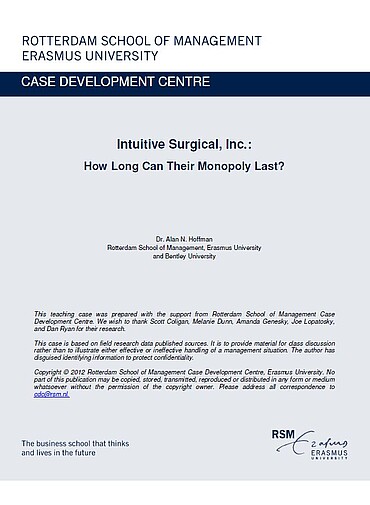Citation Note
Based on published sources; 27 pages.
Follow the 'handle' link to access the Case Study on RePub.
For EUR staff members: the Teaching Note is available on request, you can contact us at rsm.nl/cdc/contact/
For external users: follow the link to purchase the Case Study and the Teaching Note.
description
As the global market leader in robotic surgical appliances, Intuitive Surgical had to safeguard its market share in a complex social, economic, and political environment.
Abstract
The da Vinci Surgical System, which performs urologic, gynecologic, cardiothoracic, and general operations less invasively and more effectively than traditional procedures, is the flagship product of Intuitive Surgical, a US-based global technology leader in robotic surgery. As a prime mover of this technology, Intuitive Surgical enjoys the biggest market share and the benefit of establishing its brand before competitors entered the market. Over the years, it has built barriers to new entry, including superior product offerings, intellectual property protection, multiple regulatory clearances, a large installation base, worldwide training centers, strong customer relationships, and an excellent balance sheet. Though Intuitive Surgical has no serious competitors today, it does have concerns and challenges. One major concern is the displacement of surgeons and nurses at client facilities. Another is product safety – one slight error in calibration can result in fatalities detrimental to the company’s image, as well as legal battles. The expiration of the company’s existing patents in 2016 poses a serious challenge. Once these patents expire, competitors can utilize those technologies in the marketplace, and Intuitive Surgical’s competitive advantage will be lost.
usage
This case is written in a way that complex strategic decisions can easily be analyzed during limited classroom discussion time. Professors have commented that the case has worked well in their classrooms.
